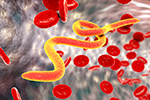
The war torn South Sudan and Northern Uganda both saw thousands of its children develop a severe form of epilepsy starting in 1990. When the children were given food or exposed to cold temperatures, they uncontrollably nodded their heads. Their disease worsened, leading to disability and often death.
Recently scientists found a possible link. They believe infection by a parasitic worm, Onchocerca volvulus, is triggering the children's own immune system to attack their neurons. The first clue was that areas with high rates of infection by the worm, which causes river blindness, also correlated with high rates of the nodding syndrome.
In the new research, scientists looked in patients' blood and cerebral spinal fluid for antibodies that reacted to the person's own proteins. They identified four antibodies that were one hundred times higher than in unaffected villagers.
In particular, antibodies to a protein called leiomodin-one or LM-one were found in over half of the nodding syndrome children and in much higher amounts. When researchers added these antibodies to cultured human neurons, the neurons died suggesting the same was happening inside the patients.
It turns out the worm carries a protein that resembles the human LM-one. This is called molecular mimicry, where the worm evolved to create these similar proteins in order to divert its host so attack itself giving the worm a chance to survive. These results are not definitive, but could lead to promising treatment for over thirty one African countries that now report nodding syndrome.
More Information
Mystery nodding syndrome may be triggered by parasitic worm
In some communities, roughly half of families had at least one child with the condition, called nodding syndrome; by 2013, an estimated 1600 children in Uganda were affected. But the cause of the devastation was a mystery. Now, a study finds that a parasitic worm often found in the children might trigger the body's own defenses to attack neurons...
South Sudan country profile
South Sudan gained independence from Sudan on 9 July 2011 as the outcome of a 2005 agreement that ended Africa's longest-running civil war...
Ivermectin (Systemic)
Ivermectin is a member of the avermectin class of broad-spectrum antiparasitic agents which have a unique mode of action...